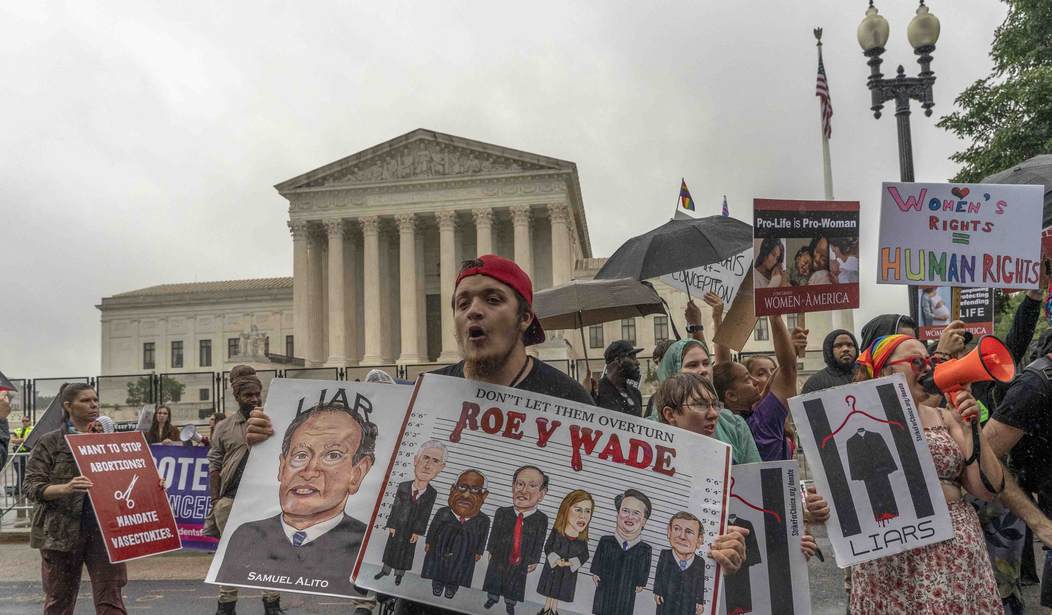As we get increasingly closer to the November midterm elections, FiveThirtyEight has released another edition of its findings on what issues Americans care most about. This release, from a survey that was conducted June 27-July 5, is particularly of interest, as it was the first such survey released since the U.S. Supreme Court on June 24 officially overturned Roe v. Wade with the Dobbs v. Jackson decision. In this particular survey, there was a sample size of 1,549 adults.
FiveThirtyEight certainly tried to make the abortion issue seem like a big campaign issue, as it did with its second release on the issue of guns. In both instances, though, from late April-early May and late May-early June, inflation remained the top issue.
During the course of the day, the headline for a write-up from Geoffrey Skelley and Holly Fuong was changed from "How Americans Feel About Abortion, Contraception, And The Right To Privacy" to highlight how "1 In 5 Americans Rate Abortion As A Top Issue After The Fall Of Roe," though that still puts it at the fourth highest issue. Just as it was for the other survey releases, inflation remained the top issue.
In this most recent poll, 62 percent of respondents said "Inflation or increasing costs" was the top issue. This is yet another increase, from 52 to 56 percent, and now from 56 to 62 percent, which is certainly bad news for President Joe Biden and the Democrats.
The second place issue, "Crime or gun violence," fell from 42 percent to 34 percent. The third place issue, "Political violence or polarization," grew from 29 percent to 33 percent.
Recommended
Then came abortion, the fourth place issue, which jumped from 9 percent to 19 percent.
Skelley and Fuong bury what is perhaps the most critical part of the findings, which is that abortion isn't suddenly making voters who weren't going to vote any more likely to vote. Emphasis is original:
...Moreover, abortion (or any other issue, for that matter) doesn’t seem to have made people who weren’t likely to vote say they are now likely to vote. A lot of coverage has cited polls that ask respondents whether the Supreme Court’s decision has made them more likely to vote, but respondents who were already likely to vote could still answer “more likely” in such surveys, so those figures don’t tell us that much about potential increases in voter engagement. Meanwhile, in our survey, the share who said they were likely to vote has hardly changed across the three waves — and there’s been little change by party, too.
While polls love to emphasize how respondents agree with the Roe decision, it's worth emphasizing that this is likely because they do not understand it. For when they are polled as to if abortion should be left to the states, which is what overturning Roe did, they're more likely to agree with the abortion issue being handled in such a way.
Skelley seem hellbent on tying Roe to a so-called right to privacy, though the results may not exactly be what they were hoping for or expecting:
Interestingly, most Americans supported the underlying argument for Roe — that there is a right to privacy established in the Constitution; only not everyone agreed that it applied to abortion. Overall, 65 percent of Americans said the Constitution contains a right to privacy; only 10 percent said “no,” with almost no differences across party lines. However, a plurality (39 percent) said there was no legal right to abortion in the Constitution, while 30 percent said there was, a split largely driven by Republicans (70 percent of whom said there was no legal right to abortion).
It would appear, then, that a plurality of respondents agreed with the Supreme Court's findings in the Dobbs decision, which is that the so-called right to an abortion is not in the Constitution, and it's thus for the states to figure out.
It's worth noting that the write-up does contain fear-mongering on the abortion and contraception issue, by raising concerns, as many pro-abortion Democrats and their media allies have, that other rights are at risk, especially when it comes to contraception and same-sex and interracial marriage. "For instance, the Dobbs decision may have opened the door to future judicial rulings that threaten long-protected access to different forms of contraception," the write-up claims.
There's a Pew article cited, "Some States Already Are Targeting Birth Control." The article, though, is specifically about forms of contraception which may act as abortifacients, such as IUDs or Plan B, the latter which is a form of emergency contraception.
Skelley and Fuong even claim that Republican states are looking to ban abortions for exceptions without the life of the mother. "In fact, while Republicans were more likely to oppose abortion than Democrats or independents, they, like most Americans, rejected the idea of making abortion fully illegal, with no exceptions. This is notable because a number of almost entirely Republican-run states could end up with abortion bans that contain no allowances in cases of rape, incest or when the mother’s life is in danger," the write-up also claims.
I addressed the claims earlier in a piece about The New York Times article from last month that FiveThirtyEight linked to, which could not even provide direct evidence of a state that had passed or was considering an abortion ban that did not contain exceptions for the life of the mother.
Again, the lede is buried, making the 1 in 5 number used in the headline even more useless. As Skelley and Fuong close their piece by writing:
Finally, while about 1 in 5 respondents cited abortion as a top issue, 3 in 5 named inflation or rising prices. Moreover, higher prices, particularly higher gas prices, often correspond with abysmal presidential approval ratings, which, of course, usually align with worse midterm performances by the president’s party. We didn’t ask about job approval, but President Biden’s favorability numbers remained poor: Thirty-three percent registered a favorable opinion of him, compared with 59 percent who held an unfavorable view. Those numbers were somewhat better among likely voters (40 percent favorable, 59 percent unfavorable), but still quite negative for Biden.
In other words, abortion has become a more pressing topic in the midterms, but the fundamental worry about rising prices and Biden’s low standing could still be a major boon to Republican fortunes in the fall.
Democrats can make these upcoming midterm elections about the abortion issue as much as they want, but it just isn't going to save them.
























